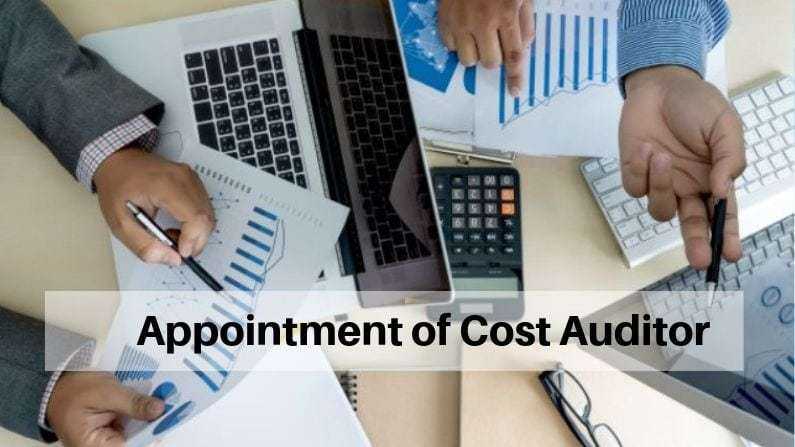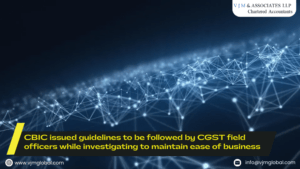Companies Act, 2013 prescribes various types of audit based on nature of activities carried out by the company such as Internal Audit, Audit of Financial statements, Cost Audit, secretarial audit etc.
Audit is carried out to verify that whether the information provided by the company is correct or not or whether the company is complying with the provisions of applicable law or not.
Similarly, Section 148 of Companies Act, 2013 (“The Act”) read with Companies (cost records and audit) Rules, 2014 (“The Rules”) provides for cost audit and appointment of cost auditor of specific items to be specified by central government.
1. Maintenance of Cost Records by Companies (Section 148(1) of the act read with Rule 3 of the rules)
Section 148(1) of the act provides that central government may specify particular class of companies which shall keep particulars related to utilization of material or labor or other items of cost as a part of its books of accounts
Central government has specified list of such companies in Rule 3 of the Rules. As per such rule, every company (as defined u/s 2(42) of the act) which is engaged in the production of the goods or provision of services (specified in the mentioned table) and having an overall turnover from all its products and services of INR 35 Crores of more during the immediately preceding financial year, shall maintain cost records as a part of Books of accounts.
2. Applicability of Cost Audit (Section 148(2) of the act read with Rule 3 of the rules)
Section 148(2) of the act empowers central government that it may direct audit of cost records of particular class of companies, which are required to maintain cost records under sub-section (1) and which have a specified amount of net worth or turnover.
In pursuance of power given under section 148(2), central government has specified vide Rule 4 of the rules that following class of companies \are required to get their cost records audited:
- Every company specified in item (A) of rule 3 shall get its cost records audited if:
- overall annual turnover of the company from all its products and services is INR 50 Crores or more during immediately preceding financial year and
- the aggregate turnover of the individual product or services for which cost records are required to be maintained under rule 3 is INR 25 Crores or more.
- Every company specified in item (B) of rule 3 shall get its cost records audited if:
- the overall annual turnover of the company from all its products and services is INR 100 crores or more during immediately preceding financial year and
- the aggregate turnover of the individual product or service or for which cost records are required to be maintained under rule 3 is INR 35 crores or more.
3. Non-applicability of Cost Audit (Rule 4(3) of the rules)
Rule 4(3) of the rules provides exemption from cost audit to the companies covered under Rule 3, which fulfills following criteria:
- Revenue of company from exports in foreign exchange exceeds 75% of its total revenue or
- Company operating in special economic zone or
- Company which is engaged in generation of electricity for captive consumption through Captive Generating plant.
4. Appointment of Cost Auditor (Section 148(3) of the act read with Rule 6 of the rules)
4.1 Time Limit for appointment of Cost Auditor
Cost audit, as mentioned u/s 148(2), shall be carried by Cost Accountant* who shall be appointed by Board of Directors of the company within 180 days from commencement of every Financial Year.
*Cost accountant term is defined under Rule 2(b) & 2(c) of the rules which means a cost accountant in practice. Cost accountant in practice means a cost accountant u/s 2(1)(b) of the Cost and works accountant act, 1959, who holds a valid certificate of practice. It includes firm and limited liability partnerships.
4.2 Prior consent and certificate to be obtained from cost auditor
Before appointment of cost auditor is made, company is required to obtain written consent of auditor to such appointment and also a certificate on following points:
- the individual or the firm is eligible for appointment and is not disqualified for appointment under the Act, the Cost and Works Accountants Act, 1959 (23 of 1959) and the rules or regulations made thereunder
- the individual or the firm satisfies the criteria provided in section 141 of the Act, so far as may be applicable;
- the proposed appointment is within the limits laid down by or under the authority of the Act; and
- list of proceedings against the cost auditor or audit firm or any partner of the audit firm pending with respect to professional matters of conduct, as disclosed in the certificate, is true and correct.
4.3 Intimation of appointment of auditor
Every company shall inform concerned cost auditor of his appointment. No time limit is given under the act to intimate cost auditor about his appointment, however, company should him within reasonable time.
4.4 Intimation of appointment of cost auditor to RoC
Every company shall file notice of appointment of cost auditor with Central Government within 30 days of board meeting in which appointment is made or within 180 days from date of commencement of Financial Year, whichever is earlier.
Company shall intimate RoC through electronic mode in Form CRA-2.
4.5 Period of validity of appointment of Cost Auditor
Cost auditor shall hold his office till the expiry of 180 days from the closure of financial year or till he submits the cost audit report for the Financial year for which he has been appointed.
4.6 Removal/Resignation of Cost Auditor
Cost auditor may be removed from his office before the expiry of his term through a board resolution. However, before removing him from his office, company is required to give a reasonable opportunity of being heard to the Cost Auditor and also record reasons for his removal in writing.
Further, auditor may also resign from his office before the expiry of his term.
4.7 Appointment of cost auditor in case of casual vacancy
If any causal vacancy arises in office of a cost auditor whether due to resignation or death or removal, then it shall be filled by the Board of directors within 30 days of such vacancy.
Further, company shall intimate Central Government about such appointment in Form CRA-2 within 30 days of such appointments of cost auditor.
5. Information to be furnished in CRA-2
Company is required to provide following information in CRA-2:
- Corporate Identification Number (“CIN”)
- Name, address and email-id will auto-populate based on CIN
- Phone No.
- Nature of intimation of appointment of cost auditor
- Original
- Filing due to amalgamation or demerger-This clause is applicable if any transferee company acquires the Products/Services/Industries/locations of transferor company for which cost auditor was appointed and the same is also continued to be the cost auditor for that category then intimation should be filed under the category ‘Filing due to amalgamation or demerger’.
- filing for appointment of auditor due to casual vacancy
- other-In case of any errors in the form already filed or any change in the scope of cost auditor(s) whether due to any addition/deletion of products/Services/Industries/ locations then the intimation shall be filed under the category ‘Others’.
- SRN of CRA-2 filed earlier for appointment of cost auditor(s) for the current Financial Year
- Product(s)/ Service(s) to which Cost Audit relates:
- Number of Industries/Sectors/Products/Services (CETA Heading Level, wherever applicable as per rules) covered under regulated sectors:
- Industries/sectors/products/services
- CETA Heading
- No. of tariff items/products/services
- Number of Industries/Sectors/Products/Services (CETA Heading Level, wherever applicable as per rules) covered under non-regulated sectors:
- Industries/sectors/products/services
- CETA Heading
- No. of tariff items/products/services
- Number of Industries/Sectors/Products/Services (CETA Heading Level, wherever applicable as per rules) covered under regulated sectors:
- Details of all the cost auditor(s) appointed
- Number of cost auditors appointed
- Category of auditor-Individual/partnership firm/Limited Liability Partnership
- Membership number of the cost auditor or member representing the firm/LLP
- Name of the cost auditor or member representing the firm/LLP
- Firm Registration Number(FRN) of the Cost Auditor/Cost Auditor’s firm/LLP
- Name of the Cost auditor’s firm/LLP
- Address
- Date of the board meeting in which cost auditor was appointed
- Type of appointment
- Scope of audit of the cost auditor/firm/LLP
- Financial year to be covered by the cost auditor(s)
- Is there any change in cost auditor(s) appointed from the previous financial year
- Attachment to be made to CRA-2:
- Copy of board resolution of the company
6. Due date of filing of CRA-2
Due date for filing of CRA-2 is based on nature of appointment for which form is being filed, which is as follows:
| Nature of appointment | Due date of filing of CRA-2 |
| In case of Original filing | Within 30 days of the date of board meeting or 180 days of the start of the financial year, whichever is earlier |
| In case of filing due to casual vacancy | Within 30 days of the date of board meeting [earliest date from the appointments made due to casual vacancy] |
| In case of filing due to amalgamation or demerger | No time limit mentioned |
| In case of others | Within 30 days of the date of board meeting [earliest date from the appointments made for new products/ services] |
7. Legal Fee applicable on filing of CRA-2
Filing fee for CRA-2 will be based on nominal share capital of the company, which is as follows:
| Nominal Share Cpaital | Fee Applicable |
| Less than 1,00,000 | INR 200 |
| 1,00,000 to 4,99,999 | INR 300 |
| 5,00,000 to 24,99,999 | INR 400 |
| 25,00,000 to 99,99,999 | INR 500 |
| 1,00,00,000 or more | INR 600 |
However, in case of company not having any share capital, fee of INR 200 will be applicable.
8. Additional Fee applicable in case of delay in filing of CRA-2
If company fails to files CRA-2 within prescribed time limit then additional fee shall be applicable based on delay in number of days:
| Period of Delay | Fee Applicable |
| Upto 30 days | 2 times of normal fees |
| More than 30 days and upto 60 days | 4 times of normal fees |
| More than 60 days and upto 90 days | 6 times of normal fees |
| More than 90 days and upto 180 days | 10 times of normal fees |
| More than 180 days | 12 times of normal fees |
9. Consequences of delay/Non-filing of CRA-2
9.1 Consequences for Companies
If company fails to file CRA-2 within stipulated time then the company will be punishable with fine of Minimum INR 25,000 which shall not exceed INR 5,00,000.
Further, officer in default will be punishable with imprisonment for a term which may extend upto 1 year or with fine of minimum INR 10,000 but which shall not exceed INR 1,00,000.
9.2 Consequences for Cost Auditor
Cost auditor in default shall be punishable with fine of minimum INR 25,000 but shall not exceed INR 5,00,000 or 4 times of remuneration of auditor, whichever is less.
Provided further, if auditor contravenes any provisions knowingly or wilfully with the intention to deceive the company or its shareholders or creditors or tax authorities then he shall be punishable with imprisonment for a term which may extend to 1 year and fine of minimum INR 50,000 but not exceeding INR 25,00,000 or 8 times of remuneration of the auditor, whichever is less.
In addition, cost auditor shall be liable to—
(i) refund the remuneration received by him to the company; and
(ii) also pay for damages to the company, statutory bodies or authorities or to members or creditors of the company for loss arising out of incorrect or misleading statements of particulars made in his audit report.
Read more Compliance for companies registered under ROC
Read more Resignation of Auditor






